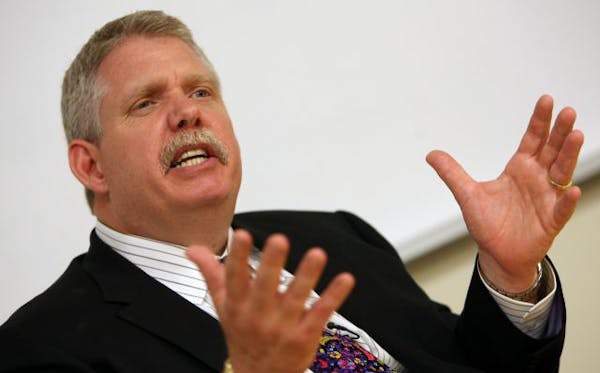A few boulders are among the most popular spots at the YMCA's Camp du Nord on the southern edge of the Boundary Waters Canoe Area Wilderness.
It's not because of the views. The added elevation gets better cell-phone reception.
A few miles north at the Lodge of Whispering Pines, the sauna is the only place that gets a signal, making for a lot of sweaty conversations.
We long to escape the daily grind, but because of job pressures or a need to stay connected, we just can't seem to turn our cell phones off, observers say. If we do make an escape, we want a lifeline -- a place where we can tap into the world we left behind -- even if it means hopping into a car and heading to the nearest town.
"Very few of my clients are able to completely unplug," said Marcia Grant, owner of the North Oaks Travel Leaders agency. "Most are looking for vacation options where they can have access to their businesses for brief periods of time each day."
That need to stay connected has generated debate among resort and campground operators in Minnesota: How can you balance making visitors feel like they're escaping when they're really not?
"The owner is trying to provide the opportunity to get away from it all, but their guest is saying, 'Well, yeah, but I can't really get away from it all,'" said Dave Siegel, executive vice president of the Minnesota Resort and Campground Association. "So it is a bit of a tug of war."
For the most part, resort owners are accommodating their guests' needs, partly, Siegel said, because they realize that vacations aren't what they used to be.
"I just think the expectations of work and the recession have probably exacerbated that situation," he said. "They're afraid to leave it all behind. There is really a fear that I might not have a job when I get back."
And it's becoming evident that vacationers who do want that lifeline don't want to have to go to the lodge to wait in line for a common computer.
"There's that population that's bringing their laptops and their iPads and they want, at a minimum, wired access, but more and more they're expecting wireless," Siegel said. "It's being asked for a great deal."
The flip side
A true getaway can provide a much-needed break -- as well as a pleasant surprise, according to Explore Minnesota Tourism spokeswoman Joan Hummel.
"Resorts and campgrounds also hear from travelers who say, 'Your resort doesn't provide a television. And it was really great to get the kids away from TV and we engaged differently with each other and with nature,"' she said.
Research on stress indicates that the daily hassles of life -- the commute, technology -- take as great a toll on physical and mental health as the bigger stresses, such as moving. Vacations, like any break in routine, are "immensely healthy," said Dr. Kristin Vickers Douglas, a Mayo Clinic psychologist with clinical and research expertise in stress.
"The ideal for emotional well-being is to be able to experience things in the here and the now as they are happening," she said. "But so much of our technology is prompting us about things that are going to happen or that we need to do in the next days, in the next minutes."
Let's say, she said, you're out fishing and zoning out. It's just you and the fish. Then your smart phone buzzes.
That relaxation is "ripped out of that place and thrown back to work. 'I wonder if it's this person. I better check to be sure. I sure hope it's not the office.' And then it takes quite a bit of time and effort to redirect your attention back to the here and the now."
Realistic advice
But Vickers Douglas acknowledges that severing all connection with daily life has its own challenges. And, for some, having the ability to check in with home or work can be more relaxing than completely unplugging, Siegel said.
"They're more nervous about not checking e-mail than they would be checking it," he said. "They feel better and they're able to enjoy their vacation more if they can check in."
If that's the case, Vickers Douglas suggested at least turning off the prompts on your phone that indicate a call, text or e-mail. And schedule a time that you are going to check e-mail: "Maybe before the kids get up or at a slower time. But give yourself time limits," she said.
That way, you give your vacation the chance to do what it's supposed to do: Make you feel better.
"If I want to go back to work after this vacation feeling vigorous, healthy, motivated and like I refreshed myself, then we're going to have to let go and immerse ourselves in the vacation and experience the benefits of it," she said. "And that will be work and effort even though the vacation is supposed to be easy.
"Being able to do that builds up your emotional and physical buffer to be able to go back and face your life."
Need cell? Be discreet
But if individuals are wrestling with these issues, so are the vacation spots. No one wants to hear someone else yakking on a cell phone while hiking in the north woods.
That's why Camp du Nord's welcome booklet advises that electronic devices should be used only in individual cabins. If a camper is talking on a cell phone in a public area, staff members will discreetly remind the person of the rules.
"We have the philosophy of staying in touch with nature rather than having electrical products," said board member Jacqueline Ricks of Orono.
The board has been debating whether to add a common-use computer in the camp store to give people the opportunity to check e-mail. The green aspect plays a role as well.
"Is it better to have them check e-mail for five minutes and then they can relax and enjoy vacation?" she said. "Or is it better to have them jump in a car and drive to Ely to check it? Which is greener?"
At Camp du Nord the issue has been put on hold. At least until the end of summer.
Suzanne Ziegler • 612-673-1707

An NPR editor who wrote a critical essay on the company has resigned after being suspended

